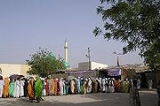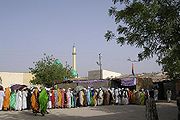
Elections in Eritrea
Encyclopedia
The elections in Eritrea select representatives from the country's six regions for the National Assembly
. Elections also occur to elect representatives for the country's regional assemblies
and other posts within the country's districts
.
reported that Eritreans have elected 399 representatives in the country's six regions in a lengthy process that will lead to the formation of a constituent assembly. The regional elections began on 4 January 1997 in some parts of the country and were completed in others by March 1, 1997. Eritrea is a single-party state
. This means that only one political party, the People's Front for Democracy and Justice
is allowed to hold effective power.
Eritrean National elections were set for 1997 and then postponed until 2001, it was then decided that because 20% of Eritrea's land was under occupation that elections would be postponed until the resolution of the conflict with Ethiopia
. Local elections have continued in Eritrea. The most recent round of local government elections were held in May 2003.
On further elections, the President's Chief of Staff, Yemane Ghebremeskel said,
was elected president of Eritrea by the national assembly in 1993. He has since been the de facto leader before independence with no legal opposition to his rule. Presidential elections, planned for 1997, never materialized.

and local courts
took place in all regions of Eritrea in December 2002 and May 2004. The polls were considered free and fair by the National Elections Commission.
National Assembly of Eritrea
The National Assembly has 104 members, 64 members appointed and 40 members representing the members of the Central Committee of the People's Front for Democracy and Justice . According to the IPU parliament has 150 indirectly elected members. The National Assembly was composed in February 1992...
. Elections also occur to elect representatives for the country's regional assemblies
Regional Assemblies of Eritrea
Lower Regional Assemblies of Eritrea are in each of Eritrea's six zones. These Assemblies are responsible setting a local agenda in the case that they are not overruled by the National Assembly. These Regional Assemblies are popularly elected within each region. Unlike the National Assembly of...
and other posts within the country's districts
Districts of Eritrea
The regions of Eritrea are divided into districts, as follows:-Anseba Region:* Adi Tekelezan* Asmat* Elabered* Geleb* Hagaz* Halhal* Habero* Keren City* Kerkebet* Sela-Central Region:* Berikh* Ghala Nefhi* North Eastern* Serejaka...
.
National government
The National Assembly of Eritrea (Hagerawi Baito) has 104 members, 60 members that are appointed and 44 members that represent the members of the Central Committee of the People's Front for Democracy and Justice. According to the Inter-Parliamentary Union (IPU), parliament has 150 indirectly elected members. The National Assembly was composed in February 1992. Agence France-PresseAgence France-Presse
Agence France-Presse is a French news agency, the oldest one in the world, and one of the three largest with Associated Press and Reuters. It is also the largest French news agency. Currently, its CEO is Emmanuel Hoog and its news director Philippe Massonnet...
reported that Eritreans have elected 399 representatives in the country's six regions in a lengthy process that will lead to the formation of a constituent assembly. The regional elections began on 4 January 1997 in some parts of the country and were completed in others by March 1, 1997. Eritrea is a single-party state
Single-party state
A single-party state, one-party system or single-party system is a type of party system government in which a single political party forms the government and no other parties are permitted to run candidates for election...
. This means that only one political party, the People's Front for Democracy and Justice
People's Front for Democracy and Justice
The People's Front for Democracy and Justice is the current ruling political movement in Eritrea. It is nominally and often considered African socialist and holds itself open to nationalists of any political affiliation. It is the successor to the Eritrean People's Liberation Front...
is allowed to hold effective power.
Eritrean National elections were set for 1997 and then postponed until 2001, it was then decided that because 20% of Eritrea's land was under occupation that elections would be postponed until the resolution of the conflict with Ethiopia
Ethiopia
Ethiopia , officially known as the Federal Democratic Republic of Ethiopia, is a country located in the Horn of Africa. It is the second-most populous nation in Africa, with over 82 million inhabitants, and the tenth-largest by area, occupying 1,100,000 km2...
. Local elections have continued in Eritrea. The most recent round of local government elections were held in May 2003.
On further elections, the President's Chief of Staff, Yemane Ghebremeskel said,
"The electoral commission is handling these elections this time round so that may be the new element in this process. The national assembly has also mandated the electoral commission to set the date for national elections, so whenever the electoral commission sets the date there will be national elections. It’s not dependent on regional elections, although that might be a very helpful process.
Multipartyism, in general principle yes, it is there but the law on political parties has to be approved by the national assembly. It was not approved the last time. The view from the beginning was that you don’t necessarily need a party law to hold national elections. You can have national elections and the party law can be adopted at any time. So in terms of commitment it’s very clear, in terms of the process it has its own pace, its own characteristics."
President
Isaias AfewerkiIsaias Afewerki
Isaias Afewerki is the first and current President of Eritrea, attaining that status when he led the Eritrean People's Liberation Front to victory in May 1991, thus ending the 30-year old armed liberation struggle that the Eritrean people refer to as "Gedli".-Early life and rise to power:Afewerki...
was elected president of Eritrea by the national assembly in 1993. He has since been the de facto leader before independence with no legal opposition to his rule. Presidential elections, planned for 1997, never materialized.

Regional elections
Regional and local elections for regional assembliesRegional Assemblies of Eritrea
Lower Regional Assemblies of Eritrea are in each of Eritrea's six zones. These Assemblies are responsible setting a local agenda in the case that they are not overruled by the National Assembly. These Regional Assemblies are popularly elected within each region. Unlike the National Assembly of...
and local courts
Community Courts of Eritrea
The Community Courts of Eritrea are the foundation of the judicial system in Eritrea. The courts typically hear cases regarding minor infractions, typically involving sums of less than approximately $7,300 ....
took place in all regions of Eritrea in December 2002 and May 2004. The polls were considered free and fair by the National Elections Commission.

